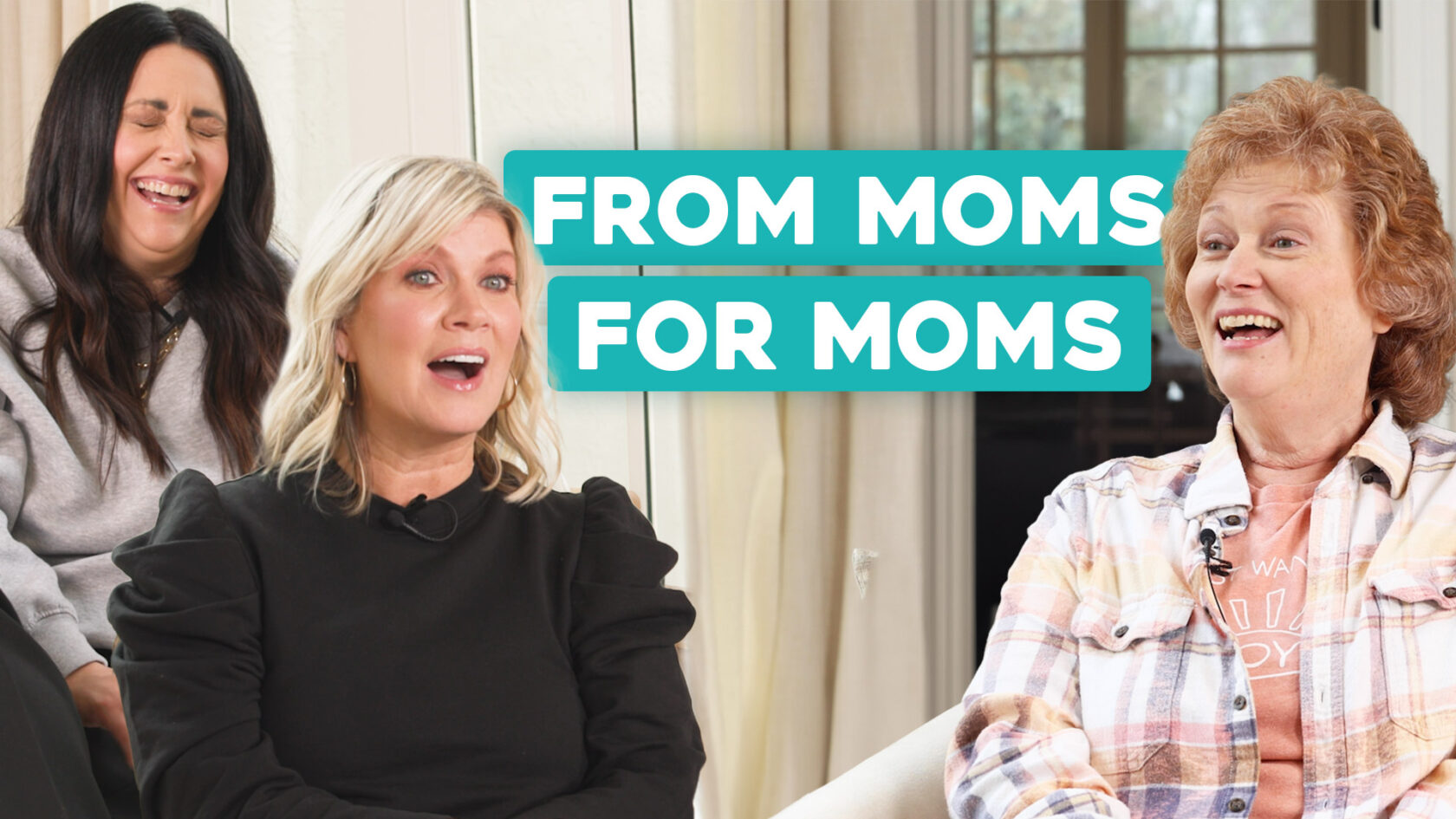Being a mom today is difficult. Can I get an “Amen”?
Sandi had the opportunity to talk with Natalie Grant and Hope Darst about all aspects of parenting! From the hilarious moments to the importance of pouring into their kids’ identities and teaching them their worth and value. The conversation touches on the struggles of parenting in the digital age and the need for constant communication and listening to their children.
They also discuss the power of repentance and forgiveness in parenting and the impact it can have on their children’s understanding of the gospel. The interview concludes with a reflection on the blessings of parenting and the joy of seeing their children love Jesus and each other.
View this video with Natalie Grant, Hope Darst and other interviews with JOY FM artists videos on the JOY FM YouTube Channel.
Sandi Brown:
The balance and to pour into who they are, not just modifying behavior. Right? Yes. So what’s something that maybe you have said to your daughters or a combination of that you want to pour into who they are so that helps them navigate with a tender heart towards God or Right. I dunno what that is for. I don’t want to put anything on the table, but if you could open their little hearts and pour something in, what do you hope you have poured in or what would you want to pour in?
Natalie Grant:
It’s even funny, even now when all three of my girls are so radically different from each other. I mean even the twins are a grand canyon apart in the things. But when I boil it down to, okay, this is circumstantially what your situation looks like right now, and this is what yours looks like and this is what yours looks like. But then when I boil down to what’s the root, it’s identity, every time it’s identity, it’s you feeling, if I am talking to one of them about this insecurity, she doesn’t feel worthy or loved or enough in this way and it might be completely different than her sister or this person, but I can always boil it down to this is actually down, comes down to your identity. And if I’m pouring into my girls, it’s constantly pouring in who they are and whose they are.
And that idea of nobody else gets to define if you’re enough. The definition of that isn’t even up for debate. You are enough because he is enough. You are on our own, none of us are. But because of Jesus, he puts something in you that actually is enough. And I think that that constant question of their identity, especially all of us, I remember struggling with that. So these are at tale as old as time. All of these issues are not new issues, but how to navigate them in this world that we’re living in is a completely different thing. The pressures that they’re facing, just even in school, you’re just like, wait, the kids these days are different. The things they say or the pressures that they feel or I can’t fathom. I remember how hard it was for me when I was 15 or 16.
I can’t imagine what it would be like in this day and age. So I think that constantly pouring in to their identity and then also listening a lot, you have to create space. Your kids are not, some kids are just not going to want to talk to you. They’re just not going to want to. I’m grateful that two of my three are talkers, but my other one’s an internal processor. So you have to create space for her to have a conversation. And I realize if I’m always talking at her, then I’m never going to get from her how she’s really feeling. If I put her on the spot, she’s just going to be like, oh, I’m fine, I’m fine. But if I just go to her room and I just climb on her bed, I put myself in her space and just eventually she begins to talk and open up. And I think sometimes as parents, we are so busy and we are so caught up in what’s happening in our world, one of the most important things you can do is give your kids your time. That’s
Sandi Brown:
A good word. And sometimes being available as much as we can because sometimes they’re not ready. Usually they’re ready at 10 o’clock at night when you’re ready to go to bed when you’re like, this is, yes, we’re out. We were in the same room four hours ago. That’s right. But when they’re ready, you have to be ready.
Hope Darst:
If I could reiterate that, I think so often we want parenting to be convenient.
Sandi Brown:
Whoa.
Hope Darst:
When we want to deal with the issue, when we want to address the issue, when we think it’s pertinent, when we think it’s demanding of parenting in that moment, the more I do this, the more I am forced to have to look at parenting as it is just as sacrificial and inconvenient as anything else. It actually has to be that I’m willing to be quiet when I want to say something that I’m willing to show up when I actually want to fall asleep. When I am exhausted and I have nothing left to pour out. That’s the very moment that you want to just be like, we’ll get to it tomorrow. Or it’s not that big of a deal. And God is gracious in that if we don’t, it’s fine. It’s still going to come up when it needs to. But there’s so much about it that it’s, it’s not about me time and mommy time, and how do I get all of my needs met? It’s actually how do I end this season, lay down my life and serve these kids? That is not how we want to look at parenting. We most of the time want to look at it through a lens of how do I make this work to my benefit? And it’s really actually, how do I look like the kingdom of God for these kids and show up when it’s hard.
Natalie Grant:
I’m thinking about my own parents in this moment, and I know so many people who’ll be listening to this conversation will be like, that was not my story. I did not have that. I did not get that. That’s the beautiful thing about Jesus is that he actually makes things new and can start something with you. But my parents just celebrated 66 years of marriage. They have five kids, they have 14 grandkids and now nine great grandkids. And every single person has made a decision to follow Jesus. And when I look at that, they all came to visit in the summer and I looked at my parents and I looked at actually tears me up, but I looked at generations of people sitting around them and all of us singing about the faithfulness of God. And I thought neither one, my dad came from a long legacy of ministry, but my mom didn’t.
She ended up being raised by her grandmother. Her parents got divorced, remarried, divorced again. And this is back in the forties. I mean, nobody did that, right? She came from real difficulty, but she made a decision. And that decision changed the course of generations that came after my mom. And when I think about how she parented, she didn’t project her lack in her life. I never felt like my mom was so often, I don’t even realize I’m projecting things on my kids. And I think back, I’m like my mom really submitted her life to the Holy Spirit in a way that she parented us all differently according to our needs, not according to what was easy for her or convenient for her, worked for her. It wasn’t a blanket parenting, it was an individual parenting. And now I can look back and go look at the fruit of that. And so I just think for anyone listening, don’t be like, oh, I didn’t have that and now I can’t be that. You can be that. I feel like my mom is living proof that you can make a different decision that will impact generations to follow after you.
Hope Darst:
Yeah, I would agree. Yeah. I didn’t come from, I mean, anybody that knows my story, I come from a very long line of brokenness, addiction, divorce, I mean, you name it. It’s kind of in my family lineage. And when my husband and I got married, one of my biggest fears about parenting was like even though my mom and my dad did a great job, they didn’t have a biblical reference for their own parenting. They were first generation, so they were really just trying to survive. And I remember going into parenting and feeling like, I don’t know how to do this in a way that feels like it’ll have lasting fruit. That’s really scary to me. And what that has looked like for me and my husband is actually doing hard things. It’s doing the hard things to heal my own pain and my own past and my own stuff.
It’s being in a church community and surrounding yourself with people, even when that feels hard and you don’t want to be vulnerable and you don’t want to let people in. It’s making choices that are often uncomfortable. It’s also being really quick to say you’re sorry. I was just going to say, I think that if I could say anything to a mom watching right now, there is nothing more powerful than a mom who can both repent to the Lord in front of their children and repent to them. I think there is more power wrapped up in that than probably almost anything else that we can do in parenting. It shows humility. It shows that we are under authority. It shows that we actually all still make mistakes. That is why we need the grace and the mercy of Jesus. And just because I’m 43 and they’re 13, we are still having to walk out the same relationship with the Lord even though it’s 30 years apart.
And I think that that probably has broke down more dysfunctional cycles and built healthier cycles in my parenting probably than anything else that I’ve done. I still make lots of mistakes, but I do think that my kids would say, but my mom is quick to say she’s sorry and means it. And not just to us, but I’ve shared with them when I’ve made mistakes that had nothing to do with them. I’ve shared with them when I’ve hurt a friend or I’ve done something that I regretted and had to say, I’ve had to deal. The Lord’s been dealing with me. The Lord’s been correcting me, and this is why this dah. And so our parents, I don’t think necessarily knew they had permission to do that, but I think that that is the beauty with every generation. Hopefully there is more wisdom and more ability to just take that next step further in parenting that is more like Christ than maybe the generation before. I hope my kids do it better than me. I think we all say that.
Sandi Brown:
I mean, that’s how your kids encounter the gospel. That’s right. Because they encounter repentance. They encounter forgiveness. That’s right. That’s when they encounter the gospel. Not just in teaching, but in Right. They encounter it in,
Hope Darst:
I can’t be my kid savior. And most of the time I think as moms we have this underlining thing that’s wired in us to want to do all the saving. I want to save you from pain. I want to save you from heartache. I want to save you from tragedy. I want to save you from being bullied, being insecure, not I want to save you from all the heartache. And a couple of years ago, the Lord just began to convict me. And he goes, if you’re doing all the saving, then what am I here for? And that is a really hard thing to let go and truly do. What we talk about is really our kids are not our own. But man, it’s hard to forget it when you’re walking it out day in hour by hour, year by year, but actually surrendering them and saying, you’re right. If I’m doing all the saving, then where does the gospel come into their life and change them the way that it changed me when I was 19?
Sandi Brown:
Yeah, we can’t save our kids, but we can battle for our kids. And I feel like I’ve gone through seasons where I feel like sometimes it feels like I’m fighting with my kids, but the greater battle is when we battle for us,
Hope Darst:
Fight
Sandi Brown:
For them, right for them. And that’s time in prayer. I mean, I can literally, one of my sons now, a pastor was in his rebellious season, and I would be at church just weeping for him, and I would look over and Are you ready? Okay, then we fight for you, then we pray, right? So I’m not going to settle for fighting with my kids. I’m going to battle for my kids. And just a peek down the road for you guys, my kids are older than yours, but I had the realization one day, and this is the good stuff. This is where the battle, the blessing comes after the battle. All of my kids love Jesus. They all love each other and they love my husband and I and that just like, right. I sat and I’m like, whoa. Because in so many family dynamics, ours may be in the past,
Hope Darst:
That’s not always
Sandi Brown:
The case. There’s something that’s right. But the good stuff, the blessing and why we fight for our kids is so someday they’ll love Jesus. Right? They’ll love each other and they love us as parents because you just said that’s the richness.
Hope Darst:
That’s good step of life. That’s it. I don’t know what else.



